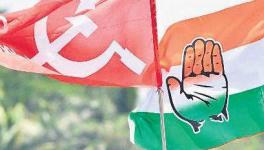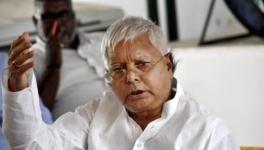Curious Case of a CM Without an Assembly
Image for representational use only.Image Courtesy : The Indian Express
Events still unfolding in Maharashtra will have—indeed are having—the most unfortunate of consequences. The Supreme Court has put off its decision on the matter until Tuesday, 26 November, though it was expected to set a time table for a vote of confidence on Monday. Whatever the court may rule, the fact remains that in India every electoral outcome has one ubiquitous phenomenon, and that is the desire of the ruling party to get its hands on the levers of power at any cost. The list of incidents is too long to reproduce here. In any case, all of it is in the public sphere. We may, however, refer to the latest such event: the snatch and grab in Karnataka.
The Indian political system runs on the basis of parties, in fact it functions through parties, even though the Constitution makes no explicit mention of them, other than in the Tenth Schedule. When a president or governor is required to invite someone to form the government, the Constitution does not require him to invite the leader of the majority ‘party’. By convention, the president invites the person who is likely to command a majority in the House, who, in fact, is often the leader of the majority party.
But elections are contested on the basis of party affiliation, and governments are formed on the basis of parties. In the 1960s, the party system came under serious attack. After the fourth general elections in 1967, a number of extremely unstable governments came to power in north Indian states—among them were Bihar and Uttar Pradesh, Madhya Pradesh and Haryana, and Odisha and West Bengal.
These governments were unstable because they were coalitions of diverse parties with diverse interests. As this diversity created insoluble contradictions, governments fell. The process of creating new regimes triggered off waves of defections or floor-crossing incidents. In one instance, a minister in Bihar crossed the floor twice in the course of one single day. There were contemporary reports that in Haryana a Member of Legislative Assembly (MLA) defected thrice in the course of a single day.
These incessant defections completely destabilised constitutional government: in Bihar, between 1967 and 1972, seven governments came into existence, with a couple of spells of President’s rule. Two more governments were formed between 1972 and 1975. The instability that dogged Bihar may have been pathological, but other states too experienced similar problems. These events prompted the government of the day to create an all-party committee to work on anti-defection law. A report was prepared and a draft readied. But all of it went into the bin.
It was only when Rajiv Gandhi became prime minister that an anti-defection law (the Tenth Schedule of the Constitution) was passed. But even as I write, the terms of this law are being violated flagrantly and with impunity. The problem is that the power to make decisions regarding disqualification of MLAs or Members of Parliament (MPs) who cross the floor lies in the hands of the Speaker.
Thus, if a number of MLAs illegally defect to another party—like the Nationalist Congress Party’s (NCP’s) Ajit Pawar has done—that then forms a government and elects its own Speaker, the odds are immediately stacked against the letter and the spirit of the Tenth Schedule being enforced. To put it baldly, at least 36 members of the NCP have to leave the parent party for the illegal defection to become a legal split. There being no indication that anywhere that number of MLAs were with Ajit, the decision to swear in Fadnavis and Ajit must be counted as one of the more egregious examples of gubernatorial misconduct in a polity littered with such malfeasance.
The willful refusal to implement the provisions of the Tenth Schedule, means that when a candidate approaches the electorate for a mandate, in a large number of cases, voters are really unaware of who they are voting for. If someone wants to vote for the Congress, he cannot vote for the candidate on offer with the full knowledge that the person being backed will continue to represent him as a Congress member. That this seriously distorts representational democracy goes without saying.
In Karnataka, the MLAs who deserted their parties to join hands with the Bharatiya Janata Party (BJP) were disqualified because the Speaker belonged to the alliance they had deserted.
In Maharashtra, a curious situation now prevails. Let us recap just a bit. On Saturday, Ajit Pawar, nephew of NCP chief Sharad Pawar and leader of the NCP legislature party, communicated to the governor that he was supporting a Bharatiya Janata Party or BJP-led dispensation with outgoing chief minister Devendra Fadnavis. The insidiously untruthful suggestion was that the entirety of the NCP legislature party had dropped the idea of a Shiv Sena-NCP-Congress coalition and plumped for the BJP. That this suggestion was false emerged during the day, but only after Fadnavis and Pawar had been sworn in chief minister and deputy chief minister.
As it happens, it emerged that Ajit commands the loyalty of a handful—at latest count that could be as few as four—and there is every chance that some of them will head back to the parent party because the BJP will not be able to put together the numbers even with Ajit’s help.
Whatever the Supreme Court may rule, and whatever outcome is produced vis-à-vis setting up a government, unprincipled defections for power or pelf must once against be dealt with. Indira Gandhi did not ultimately do it because it was not in her interest. Rajiv Gandhi, with huge countrywide majorities did it. But the law needs to be changed. The Modi regime will not make the change because they do not suit it. Only the future knows how many mandates remain to be subverted, how many parties to be broken and how many MLAs and MPs to be bought and sold.
But when the change comes, some processes should become automatic; work in a bureaucratic fashion. The initiative must be taken away from the Speaker. In cases where the government is still to be formed—Maharashtra, to wit—the Assembly secretariat or some autonomous body must determine whether there has been a split in a party entailing the departure of at least a third of the members, whether there has been a merger, approved by two-thirds of the members of the merging entity, or there has been a defection. If there has been a defection, the relevant authority should have the right to disqualify the defector.
As I said, this regime will not do it, because the Modi-Shah partnership exists on a pure political frame. For them, politics is a project of power and power alone. There singular and limited objective is hoovering up as many governments as they can and extending their power as far and wide as possible to create an India that is Opposition-free. Their signatures are scrawled all over Bihar, Karnataka, Haryana, Goa, a number of northeastern states—and now over Maharashtra.
What the power is for is the big question. It is not for development—economic, social, forget political. It is not for encouraging cultural production and, in that context, not for the promotion of diversity and dissent. I mean, in the cultural scene, forget politics. Ultimately, it appears that the single-minded objective of the Modi-Shah duumvirate is the creation of a majoritarian Leviathan that will exist for the sake of a Hindu elite.
The writer is a freelance journalist and independent researcher. The views are personal.
Get the latest reports & analysis with people's perspective on Protests, movements & deep analytical videos, discussions of the current affairs in your Telegram app. Subscribe to NewsClick's Telegram channel & get Real-Time updates on stories, as they get published on our website.
























